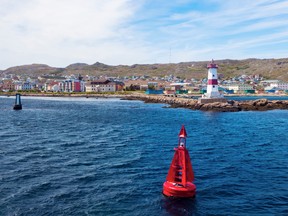France is said to be pushing to quadruple the amount of halibut Saint Pierre and Miquelon fisherman usually take. Canadians fear it will be at their expense
Article content
Hostility over halibut is pitting Canada against France in a fishing fracas, with the Canadians accusing French fishermen of overfishing their typical catch. And although the spat is being hashed out senior ministers in both governments, Canadian fishermen say it is moving too slowly and they are losing money to the French.
The tensions recall the 1995 Turbot War, when Canada seized Spanish ships fishing for turbot in Canadian waters in defiance of Ottawa’s attempt to preserve the stocks.
Advertisement 2
Article content
Today’s situation, which relates to Atlantic halibut for the waters surrounding Saint Pierre and Miquelon, a French territory near Newfoundland, is still a long way from that, but it has become a diplomatic sticking point between France and Canada.
Former halibut fisherman Gary Dedrick said that historically there were only a few French fishermen from Saint Pierre and Miquelon in Canadian waters and they took halibut as a bycatch, inadvertently caught while fishing for other species.
“So we knew what they caught and that was it. But here in the last few years, they’ve started directing for halibut, which is a whole different ballgame. And they don’t want to be accountable for what they catch,” said Dedrick, who now heads a local association representing some of the 2,000 Canadians fishermen.
Total halibut fishing off the Atlantic Coast comes to about 5,000 tons every year, worth about $100 million, according to the industry. In 2022, Canadian landings of Atlantic halibut were valued at approximately $70 million, according to Fisheries and Oceans Canada.
Atlantic halibut is a groundfish that migrates across jurisdictions and is found in waters from east of Newfoundland to the northeastern United States. Most of the stock is found in Canadian fisheries waters, with about one per cent within the French Maritime Zone, according to the Atlantic halibut council.
Article content
Advertisement 3
Article content
The amount of halibut the French used to catch was marginal, the Canadian industry says, totalling around 1.5 per cent of the annual halibut fishing. But France is said to be pushing now to quadruple the amount of halibut Saint Pierre and Miquelon fisherman usually take. If they catch more fish, Canadians fear it will be at their expense.
The Canadian fishing industry is arguing that the huge increase could become a conservation issue and cause serious economic damage to Atlantic fisheries and processors because the French are taking fish stocks that would otherwise be available to Canadian fishermen.
It also argues that Canadians have fished in the area for 200 years, while Saint Pierre and Miquelon fishermen have only been active for a few years. Many Canadian coastal communities rely on the fishing industry.
“Worldwide, we’re dealing with the Americans, we’re dealing with Greenlanders, we’re dealing with the Europeans directly. Everybody looks at what is the historic catch and the resource biomass distribution between our countries. Those are the two main criteria that anybody uses worldwide. The French are ignoring that,” said Bruce Chapman, head of the Atlantic halibut council.
Advertisement 4
Article content
Recommended from Editorial
Since 2016, Canada has been negotiating with France to reach an agreement on quota-sharing for Atlantic halibut, but eight years later nothing has come of it.
“It (the negotiation) was not the most important element of the France-Canada relationship. But these were things that could (be of interest),” said former Canadian ambassador to France, Lawrence Cannon.
But now tensions are rising in Atlantic Canada as local fishermen lose money. According to Dedrick, a Nova Scotia or Newfoundland halibut fishermen crew could lose up to $100,000 a year in income because of the French fishermen.
“I certainly don’t want it to escalate in terms of the tension. I definitely want to have a negotiated solution. The sooner the better,” Chapman said.
Fisheries Minister Diane Lebouthillier and Foreign Affairs Minister Mélanie Joly recently met with their French counterparts to discuss the issue, and Prime Minister Justin Trudeau reportedly raised the issue with French Prime Minister Gabriel Attal in June.
Advertisement 5
Article content
According to the minister Lebouthillier’s office, there were meetings between France and Canada over the predicament earlier this month, but they did not result in any agreement.
The Government of Canada has said it will examine “the range of tools at its disposal, including the suspension of reciprocal privileges under the Canada-France Procès-verbal (a bilateral fishing treaty), to ensure the long-term viability of this important fish stock and fishery so crucial to Canadians”.
“Canada remains committed to pursuing good faith negotiations with France on an equitable agreement that strikes a fair balance between preserving the resource and supporting our respective coastal economies,” Lebouthillier’s office said in a statement.
The French embassy in Ottawa did not respond to a request for comment.
Despite the frustration of Canadian halibut fishermen, things remain on a low simmer, for now.
“It is not an irritant that means that tomorrow morning, Canada and France would stop talking to each other,” says Cannon.
But Canadian fishermen still say it’s time for the French to stop taking unreasonable advantage of Canada’s halibut stock.
Advertisement 6
Article content
“Smarten up and start playing. If you want to play, you play by the rules,” said Dedrick. “That’s the way fisheries are conducted in Canada.”
National Post
atrepanier@postmedia.com
Get more deep-dive National Post political coverage and analysis in your inbox with the Political Hack newsletter, where Ottawa bureau chief Stuart Thomson and political analyst Tasha Kheiriddin get at what’s really going on behind the scenes on Parliament Hill every Wednesday and Friday, exclusively for subscribers. Sign up here.
Our website is the place for the latest breaking news, exclusive scoops, longreads and provocative commentary. Please bookmark nationalpost.com and sign up for our newsletters here.
Our website is the place for the latest breaking news, exclusive scoops, longreads and provocative commentary. Please bookmark nationalpost.com and sign up for our daily newsletter, Posted, here.
Article content








